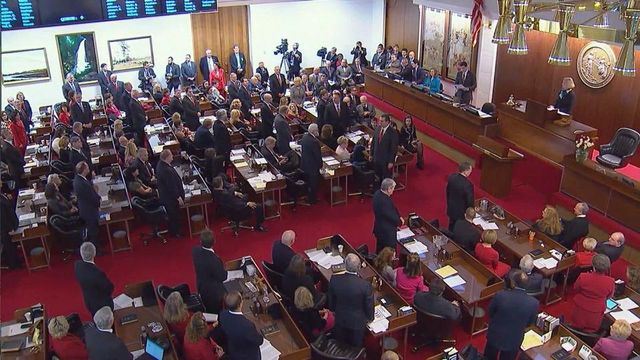Pomp fills first day of legislative session
Despite icy weather that temporarily delayed the opening of the 2015 legislative session, members of the North Carolina General Assembly took their oaths of office on Wednesday and elected their leaders.
Posted — UpdatedThe House gaveled in at 9 a.m. but immediately recessed for a half hour to ensure everyone had time to navigate treacherous roads to get to the Legislative Building. The Senate didn't go into session until 11 a.m.
Rep. Tim Moore, R-Cleveland, was the only nominee for House speaker, and no opposition to him assuming the post could be heard during a voice vote on the House floor. Moore accepted the gavel from U.S. Sen. Thom Tillis, his predecessor as leader of the state House.
"This is a great institution," Moore said. "It's a great institution not because of the building but because of the people who are here."
Despite differences in politics and personal beliefs, he said, members all work to improve North Carolina.
"There are great ideas on the problems facing North Carolina on both sides of the aisle, and I pledge to see that we arrive at those," he said. "The answers are not Republican or Democrat. They are North Carolina answers, North Carolina solutions."
Expanding the state economy and bringing more jobs to North Carolina should be the top priority of the House, Moore said, but he noted unexpected issues always arise that will require lawmakers' attention.
"At the end of the day, we need to listen to our constituents and make sure we're putting them first," he said.
Rep. Paul Stam, R-Wake, was named speaker pro tem, allowing him to lead the House in Moore's absence.
Stam noted that 2015 is the 800th anniversary of the Magna Carta and said some of the issues that led to that deal between the king of England and his nobles continue to resonate today: taxes, environmental regulations, free trade and religious freedoms.
The House voted unanimously – it marked the first vote recorded by the chamber's new electronic voting system – to approve rules for the session, including ending the practice of surprise "gut-and-amend" legislation in which the contents of a bill are stripped out and replaced shortly before a committee votes on it. The new rules require any substitute legislation be submitted to the original bill's sponsor and all members of a committee by 9 p.m. the night before a meeting.
Other rules changes include barring Sunday votes, splitting the Education Committee into three panels – one each for public schools, community colleges and the University of North Carolina system – adding a fourth Judiciary Committee and creating a Children, Youth and Families Committee.
After some other organizational moves, the House voted unanimously to adjourn until Jan. 28 – the two-week break gives leaders time to set up committees and lawmakers time to start drafting and filing bills – right around the same time that Lt. Gov. Dan Forest gaveled in the Senate.
Sen. Phil Berger, R-Rockingham, was elected by acclamation to his third term as president pro tem of the Senate, the position that controls the flow of legislation through the chamber.
"North Carolina's future stands brighter than when I stood here before you two years ago and brighter still than four years ago," Berger told his colleagues. "The changes we have implemented over the past four years have made North Carolina a better place to build a business and a better place to live and raise a family."
As with Moore, he said lawmakers should concentrate their efforts on measures that improve the state economy, including more investments in public education and reductions in government regulation.
"We won't always agree on every issue and will have spirited debates in the coming months," he said. "(But) we're here to do what's best for the state of North Carolina."
The most noteworthy rule adopted by the Senate for the session would allow the clerk to read a bill's short title instead of the lengthy descriptions previously required. The Senate also created a Workforce Development Committee.
• Credits
Copyright 2024 by Capitol Broadcasting Company. All rights reserved. This material may not be published, broadcast, rewritten or redistributed.






